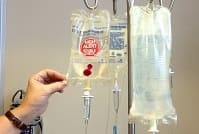
1 in 5 Health Care Workers Worldwide Have Experienced Depression, Anxiety or PTSD during the COVID-19 Pandemic
Mar 10 2021
A systematic review and meta-analysis of 65 studies involving nearly 100,000 healthcare workers across the globe has provided a more complete picture of the pandemic’s mental health impacts. Combined data from these studies, representing individuals in 21 countries, showed that 21.7% of health care workers experienced depression, 22.1% experienced anxiety, and 21.5% experienced PTSD between December 2019 and August 2020. Participants included nurses, doctors, and other health care workers or support staff. Although the findings are limited by variability in data availability across regions, this analysis provides important context for understanding health care worker needs. To learn more, see the study in PLOS One.

Cardiovascular Risk Factors Associated with Cognitive Impairment in Schizophrenia
Mar 03 2021
Among individuals with schizophrenia, conditions like diabetes and hypertension may be linked to cognitive impairment symptoms. A systematic review and meta-analysis examined 27 studies including more than 10,000 people with schizophrenia spectrum disorders to measure the relationship between cardiovascular disease (CVD) risk factors and cognitive function. Several CVD risk factors, including metabolic syndrome, diabetes and high blood pressure showed a significant association with cognitive impairment. The findings emphasize the role that heart health may play as a protective factor against some symptoms of schizophrenia disorders, and the importance of maintaining physical health when managing a mental illness. To learn more, see the study in JAMA.

Incentives May be Effective Tool for Treatment of Alcohol Use Disorders in American Indian and Alaska Native Communities
Mar 03 2021
The Helping Our Native Ongoing Recovery (HONOR) study conducted a three-month intervention in three American Indian and Alaska Native health care organizations to determine if providing incentives for alcohol abstinence would be a culturally appropriate and effective treatment model for this population. All study participants received treatment as usual and were randomized either to the contingency management group, receiving incentives for alcohol abstinence, or the control group, receiving incentives regardless of alcohol use. Participants in the contingency management group were more likely on average to maintain alcohol abstinence, indicating that an incentive model may be effective in this population. To learn more, see the study in JAMA.

Behavioral Inhibition in Childhood Shown to Predict Anxiety During COVID-19 Pandemic
Feb 11 2021
Early childhood developmental patterns may predict adverse mental health reactions to the COVID-19 pandemic and other major life events, according to new research. Researchers analyzed longitudinal data for 291 participants who were enrolled in a long-term study of social and behavioral development when they were 2 years old. Study participants — all of whom turned 18 years old in 2020 — who had experienced consistent patterns of behavioral inhibition (fearfulness of new people and objects), social wariness and excessive worry throughout childhood and adolescence showed elevated anxiety during the first months of the pandemic. Interventions to address these behaviors early on may help prevent symptoms from worsening when stressful life events occur. To learn more, see the study in Longitudinal Psychiatry.

One in Three Nurses Who Leave Their Job Report Burnout as a Leading Factor
Feb 04 2021
New research suggests that burnout contributed significantly to job dissatisfaction among nurses even before the added stress of the COVID-19 pandemic. Based on national data collected in 2018, 31.5% of nurses who left their jobs in 2017 reported burnout as a reason for leaving. Of nurses who had considered leaving their jobs, even more — 43.4% — reported burnout as a key decision factor. The COVID-19 pandemic has only exacerbated levels of stress and exhaustion among health care workers, and measures must be taken to ensure the well-being and sustainability of the nursing workforce. To learn more, see the study in JAMA. "

Substance Use Disorders More Prevalent among Transgender Adults Compared to Cisgender Peers
Feb 04 2021
Transgender adults in the U.S. are significantly more likely to have a diagnosed substance use disorder compared to cisgender adults. Using deidentified medical claims data, researchers compared substance use disorder diagnoses (SUDDs) of 15,500 transgender adults and 47,000 cisgender adults. Multi-substance SUDDs were 4 times more common among transgender adults than cisgender adults and any-drug SUDDs were over 3.6 times more common. As transgender individuals face specific social and structural issues that can impact mental health and access to care, health care efforts should consider the unique needs of this population as well as investigate and address barriers to high-quality treatment. To learn more, see the study in JAMA. "

Non-Prescribing Mental Health Professionals Can Help Meet Psychiatric Needs in Emergency Departments
Jan 21 2021
More and more people are seeking psychiatric care in emergency departments, leading to strains on staff and resources — and this trend will likely continue due to the COVID-19 pandemic. The American Association for Emergency Psychiatry (AAEP) supports the use of psychiatric emergency clinicians (PECs), which include non-prescribing mental health professionals such as licensed clinical social workers and clinical psychologists, to help meet this growing need. The AAEP recognizes the training and expertise of PECs in addressing psychiatric crisis situations, and offers recommendations for integrating them into emergency department care across the country. To learn more, see the article in Psychiatric Services.

Majority of Parents Value Teen Peer Support Leaders in Schools
Jan 18 2021
Peer support is an important part of mental health recovery, and its availability in school settings may be a lifeline for teens experiencing mental health issues for the first time. According to a recent national poll, more than three-quarters of parents (76%) believe peer leaders in schools would better understand students’ mental health challenges than teachers or counselors. Most (72%) also think access to peer support in schools would encourage students to speak up when they need help. Although parents raise concerns about training and the emotional toll on young peer leaders, overall support may inspire a new strategy to address student mental health. To learn more, see the report from C.S. Mott Children’s Hospital.

Small Study Finds Repeated Ketamine Infusions Safe and Effective for Treatment of Chronic PTSD
Jan 05 2021
One dose of intravenous ketamine can provide significant and rapid relief for symptoms of major depressive disorder and PTSD when other treatments have failed. Researchers recently conducted a randomized controlled trial to determine the drug's efficacy and safety for the treatment of PTSD when administered repeatedly over the course of two weeks. Thirty participants with chronic PTSD received six infusions of either intravenous ketamine or placebo over the study period. After two weeks, the ketamine group showed a significant reduction in symptom severity compared to the control group, without serious adverse effects. To learn more, see the study in the American Journal of Psychiatry.

Depressive Symptoms Associated with Increased Risk of Cardiovascular Diseases
Dec 15 2020
Understanding the relationship between mental and physical health is critical to improve quality of life for people living with mental illness. According to findings from an international team of researchers, depressive symptoms – even those that do not meet the threshold for diagnosis of a depressive condition – may play a role in future poor heart health. Researchers analyzed data from over 500,000 individuals and found that the presence of depressive symptoms showed a modest association with heart problems such as coronary heart disease and stroke, even after accounting for additional risk factors like smoking and diabetes. To learn more, see the study in JAMA.